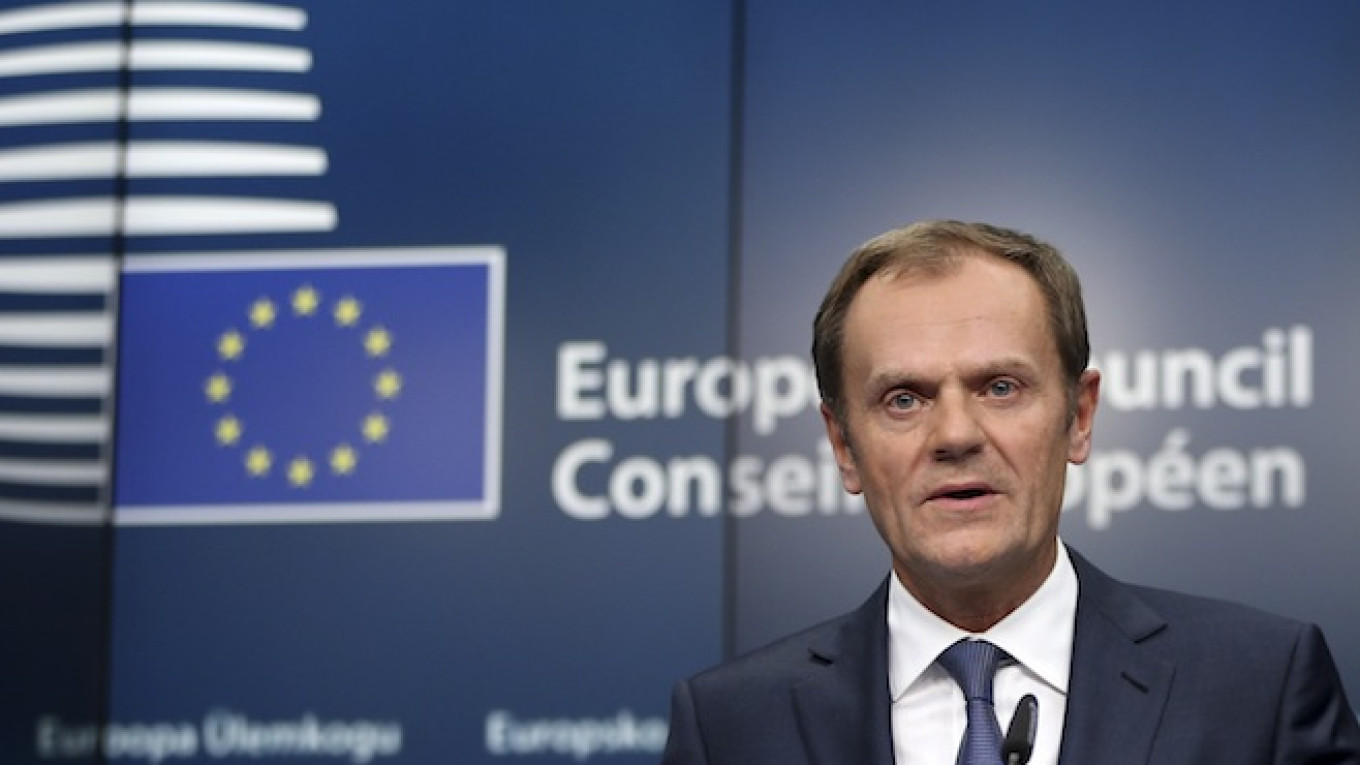BRUSSELS — European Union leaders warned Moscow they were ready exercise their combined muscle over the long haul in a confrontation with an economically wounded Russia if President Vladimir Putin refused to pull back from Ukraine.
"We must go beyond being reactive and defensive. As Europeans we must regain our self-confidence and realize our own strengths," said Donald Tusk, the former Polish premier who chaired a brief EU summit in Brussels on Thursday.
In comments that were part warning to Russia, where falling oil prices and Western trade sanctions have brought financial havoc, and part exhortation to an EU bloc divided between hawks and doves, Tusk said a united European front was vital.
"It is obvious we will not find a long-term perspective for Ukraine without an adequate, consistent and united European strategy towards Russia," he added, his remarks bringing a briskly opinionated new style to the first such meeting he has chaired as president of the leaders' European Council.
"Today we are maybe not too optimistic. But we have to be realistic, not optimistic."
Meeting on a day when Putin mounted a wordy defense of policies on Ukraine and the economy, then leaders of the 28 EU states conferred on how to handle their giant eastern neighbor longer term after a year of crisis and mutual trade sanctions that have brought warnings of a return to Cold War.
Some in the EU have said they should switch their focus away from supporting Ukraine to seeking a detente with Moscow. That might be in the longer term interests of businesses, which have suffered loss of trade and fear a spillover from the Russian financial crisis.
But for all their differences in attitudes to Russia, leaders made clear their determination to stick together as they have over the past year, while offering Putin both the threat of stick and the carrot of mutually beneficial commerce.
They agreed to keep up financial aid to help Ukraine carry out reforms to its post-Soviet political and economic systems.
"Russia is today our strategic problem, not Ukraine," said Tusk, who as Polish prime minister was among the hawks from Moscow's former communist satellites who pushed for sanctions.
"The biggest challenge today is the Russian approach, not only to Ukraine but also to the EU."
Carrot and Stick
Having enacted some previously agreed new sanctions on Thursday, they made no move to further escalate measures against Moscow, and indeed made clear that, like the U.S., they were ready to ease them if they concluded Putin was implementing a peace deal made with Ukraine at Minsk in September.
"The door is always open if Russia changes its behavior," said British Prime Minister David Cameron. "If it takes Russian troops out of Ukraine, and it obeys all the strictures of the Minsk agreement, these sanctions can go."
But German Chancellor Angela Merkel, who has taken a lead in unsuccessful negotiations with Putin, stressed: "Sanctions … can only be lifted if the reasons for them change."
Jean-Claude Juncker, the former Luxembourg premier who has taken over as head of the executive European Commission, told a news conference with Tusk that dialogue was still important.
"We have to keep channels of communication open," he said. "I have known Mr. Putin for many years, and I intend to swim in those channels and take advantage of that communication."
In some tough language that was particularly striking coming from a former Italian foreign minister seen by hawks as "soft" on Moscow, new EU foreign policy chief Federica Mogherini urged Putin to adopt a "radical change in attitude" and cooperate.
"President Putin and the Russian leadership should reflect seriously about the need for introducing a radical change in attitude towards the rest of the world and to switch to a cooperative mode," she said.
"The world has never been as dangerous and unstable."
A Message from The Moscow Times:
Dear readers,
We are facing unprecedented challenges. Russia's Prosecutor General's Office has designated The Moscow Times as an "undesirable" organization, criminalizing our work and putting our staff at risk of prosecution. This follows our earlier unjust labeling as a "foreign agent."
These actions are direct attempts to silence independent journalism in Russia. The authorities claim our work "discredits the decisions of the Russian leadership." We see things differently: we strive to provide accurate, unbiased reporting on Russia.
We, the journalists of The Moscow Times, refuse to be silenced. But to continue our work, we need your help.
Your support, no matter how small, makes a world of difference. If you can, please support us monthly starting from just $2. It's quick to set up, and every contribution makes a significant impact.
By supporting The Moscow Times, you're defending open, independent journalism in the face of repression. Thank you for standing with us.
Remind me later.


